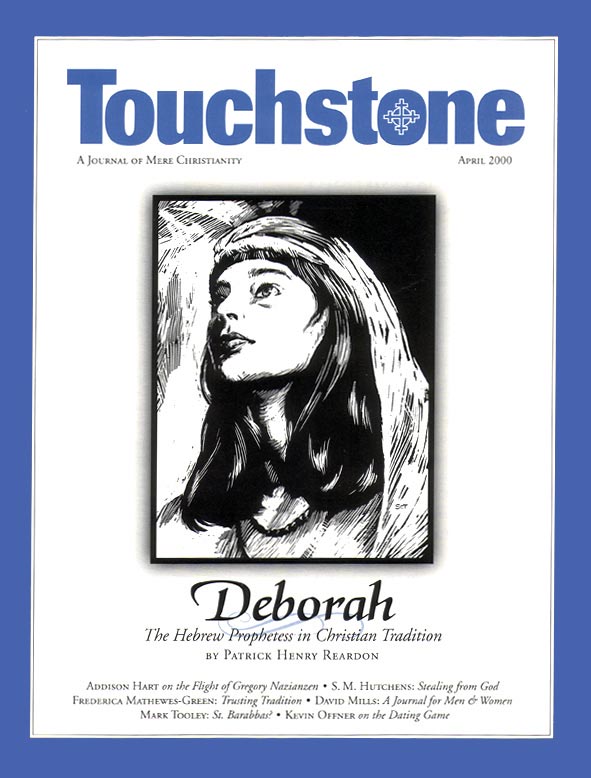Trusting Tradition
Frederica Mathewes-Green on What We Believe
My young nephew Thomas had been attending an Orthodox church with his dad for several months, and must have been impressed by an exclamation the priest makes at the turning point of the service. When the Scripture readings and sermon are concluded, the priest says, “The doors! The doors! In wisdom, let us attend!” In the ancient Church this signaled the deacon to shut the church doors behind departing nonmembers. From this point forward, the faithful would be entering into the holy mystery of the Eucharist. Only the baptized were allowed to remain.
In today’s Orthodox churches no doors are shut and no one is scooted out of the building, but it still makes for a dramatic moment. So when Thomas saw a bumper sticker commemorating the rock band “The Doors,” he told his dad, “That guy must be Orthodox!”
But after the doors are announced shut, we don’t go immediately into the Eucharistic prayers. First we chant the Nicene Creed. This may initially seem surprising; the Creed, we tend to think, is our bold witness to the world of what we believe. But early Christians had reasons to conceal it. They believed that only committed members of the faith were able to handle its details; what’s more, distorted versions of those details had too often led to persecution. So creeds were said behind closed doors, taught by word of mouth to catechumens, and not written down.
Abashed Christians
Today Christians often feel abashed about exhibiting their faith publicly, and prefer to shut the doors first, but for a different reason. It sounds kind of rude in our society to say that you believe specific things. The governing social philosophy calls for us to believe, in a general way, in almost everything, as if strolling happily through a garden of boundless blooms. The very diversity is delightful, we’re taught to think, and we should not want to limit it in any way. We want to sample and celebrate it all.
Well, not all of it, of course. Some ancient faiths sacrificed children or commanded the slaughter of unbelievers. Some forbade sex and marriage. We can’t affirm that. Some faiths taught a view of women that by today’s standards would be called sexist. Can’t have that, either.
Watch closely, now. What is the principle by which we accept some elements, and reject others? How can we feel confident accepting a faith’s view of the ecology, for example, while dismissing its view of women? What’s our authority for choosing one teaching and not the other? From inside that faith, the teachings about men and women might appear just as necessary, profound, and sacred truths unfolding the sacramental mystery of sex and gender. How do we know they’re wrong about this, especially if we think they’re right about something else? What’s our principle for making these judgments?
Well, um, it’s us. Our principle for accepting or rejecting elements is simply what we like or dislike and what fits our sense of true and untrue. How do we know our worldview is more accurate than that of the original believers who accepted all elements of this faith, both what’s currently appealing and what isn’t? How do we know we’re smarter than they were? Where does our authority to judge them come from?
Do we respond, “I look deep inside and find it”? As with the bottom kitchen drawer, people can look deep inside and find a number of things, some useful and some downright harmful, and the latter occasionally masquerading as the former. We can look inside and find noble truths and selfishness, an urge to rescue children and an urge to seduce one’s neighbor, and an urge to just get a can of beer and flip around the channels for awhile. All of this can be influenced by elements as discouragingly ordinary as how much sleep you got last night and whether those deep-fried peppers are settling the way they should. There’s lots of stuff deep inside, and not all of it can be taken at face value.
Where does this rattling drawerful of deep-inside come from? The humbling truth is that we’re not nearly as original or intellectually liberated as we fancy. We are heavily formed by our surrounding culture, and subliminally adopt attitudes and values that we can’t even see are there, so automatically are they acquired. What’s more, we’re the targets of an entire consumer economy aggressively trying to stuff us with fashionable ideas like a pâté goose, in the hope that we’ll want to buy the emblematic products to show our participation in the ideas. We take communion in the sacrament of Nike.
Frederica Mathewes-Green is a columnist for Beliefnet.com and a contributor to the Christian Millennial History Project multi-volume series. Her books include At the Corner of East and Now (Putnam), The Illumined Heart (Paraclete Press), and The Open Door: Entering the Sanctuary of Icons and Prayer (Paraclete Press). She lives in Linthicum, Maryland, with her husband Fr. Gregory, pastor of Holy Cross Orthodox Church. They have three children and three grandchildren.
bulk subscriptions
Order Touchstone subscriptions in bulk and save $10 per sub! Each subscription includes 6 issues of Touchstone plus full online access to touchstonemag.com—including archives, videos, and pdf downloads of recent issues for only $29.95 each! Great for churches or study groups.
Transactions will be processed on a secure server.
more from the online archives
calling all readers
Please Donate
"There are magazines worth reading but few worth saving . . . Touchstone is just such a magazine."
—Alice von Hildebrand
"Here we do not concede one square millimeter of territory to falsehood, folly, contemporary sentimentality, or fashion. We speak the truth, and let God be our judge. . . . Touchstone is the one committedly Christian conservative journal."
—Anthony Esolen, Touchstone senior editor











